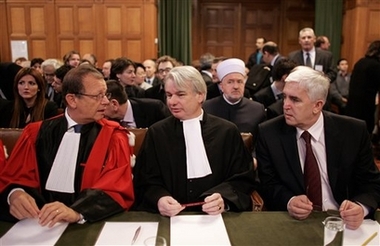by Otto Spijkers
 "Serbia is guilty! It was genocide in Bosnia." That’s what was written on a banner hanging outside the Peace Palace, where the International Court of Justice delivered the judgment in the genocide case between Bosnia and Serbia this morning. And the banner was right. The Court indeed ruled that genocide took place in Srebrenica. However, the Serbian state was only held responsible for a failure to prevent it and a failure to punish those responsible for it. And not for committing genocide.
"Serbia is guilty! It was genocide in Bosnia." That’s what was written on a banner hanging outside the Peace Palace, where the International Court of Justice delivered the judgment in the genocide case between Bosnia and Serbia this morning. And the banner was right. The Court indeed ruled that genocide took place in Srebrenica. However, the Serbian state was only held responsible for a failure to prevent it and a failure to punish those responsible for it. And not for committing genocide.
Summaries of the Court’s judgment, clearly a landmark case, can be found all over the web, and I do not intend to add yet another. I just want to point out some of the most interesting issues.
First of all, on res judicata
The Court ruled that the principle of res judicata "signifies that the decisions of the Court are not only binding on the parties, but
are final, in the sense that they cannot be reopened by the parties as regards the issues that have been determined, save by procedures, of an exceptional nature, specially laid down for that purpose." The judgment on jurisdiction (of 1996) need not be reconsidered, said the Court.
Second issue: can a state commit genocide?
Judge Higgins, who read the judgment in a chock-full Great Hall, turned to the merits. It all came down to Srebrenica. With the help of the case law of the International Criminal Tribunal for the Former Yugoslavia, in particular the Krstic case, the Court ruled that genocide had been committed in Srebrenica and that the
Bosnian Muslims were the targeted group. But the court could not stop there. The Serbian state was on trial, and not Mladic (who was the Chief of Staff of the Army of the Republika Srpska (VRS), also known as the Bosnian Serb Army) ; and thus the question was: can a state commit genocide, and is that covered by the Genocide Convention? The Court said yes. And this is, I think, the most interesting part of the judgment (it is para.166):
in the view of the Court, taking into account the established purpose of the [Genocide] Convention, the effect of Article I is to prohibit States from themselves committing genocide. Such a prohibition follows, first, from the fact that the Article categorizes genocide as "a crime under international law": by agreeing to such a categorization, the States parties must logically be undertaking not to commit the act so described. Secondly, it follows from the expressly stated obligation to prevent the commission of acts of genocide. That obligation requires the States parties, inter alia, to employ the means at their disposal, in circumstances to be described more specifically later in this Judgment, to prevent persons or groups
not directly under their authority from committing an act of genocide or any of the other acts mentioned in Article III. It would be paradoxical if States were thus under an obligation to prevent, so far as within their power, commission of genocide by persons over whom they have a certain influence, but were not forbidden to commit such acts through their own organs, or persons over whom they have such firm control that their conduct is attributable to the State concerned under international law. In short, the obligation to prevent genocide necessarily implies the
prohibition of the commission of genocide.
The third issue is attribution
 At this point, Judge Higgins paused. After the break, Judge Higgins read that the Court found that attribution was impossible. Interestingly enough, when looking at the control of Serbia over the Bosnian Serb Army, the Court applied the Nicaragua test and rejected the test in Tadic Appeals Judgment. According to the former, "it would in principle have to be proved that [the] State had effective control of the military or paramilitary operations in the course of which the alleged violations were committed"; and according to the latter: "acts committed by Bosnian Serbs could give rise to international responsibility of the FRY [Federal Republic of Yugoslavia] on the basis of the overall control exercised by the FRY over the Republika Srpska and the VRS [that is the Army of the Republika Srpska], without there being any need to prove that each operation during which acts were committed in breach of international law was carried out on the FRY’s instructions, or under its effective control." Although the Court relied extensively on ICTY case law, especially for establishing the facts (Krstic played a big role in the Court’s findings on what happened in Srebrenica), the Court this time applied its own Nicaragua criterion and thus ruled that the acts of the Bosnian Serbs in Srebrenica could not be attributed to the Serbian state.
At this point, Judge Higgins paused. After the break, Judge Higgins read that the Court found that attribution was impossible. Interestingly enough, when looking at the control of Serbia over the Bosnian Serb Army, the Court applied the Nicaragua test and rejected the test in Tadic Appeals Judgment. According to the former, "it would in principle have to be proved that [the] State had effective control of the military or paramilitary operations in the course of which the alleged violations were committed"; and according to the latter: "acts committed by Bosnian Serbs could give rise to international responsibility of the FRY [Federal Republic of Yugoslavia] on the basis of the overall control exercised by the FRY over the Republika Srpska and the VRS [that is the Army of the Republika Srpska], without there being any need to prove that each operation during which acts were committed in breach of international law was carried out on the FRY’s instructions, or under its effective control." Although the Court relied extensively on ICTY case law, especially for establishing the facts (Krstic played a big role in the Court’s findings on what happened in Srebrenica), the Court this time applied its own Nicaragua criterion and thus ruled that the acts of the Bosnian Serbs in Srebrenica could not be attributed to the Serbian state.
Fourth and final issue: All states party to the Genocide Convention failed to prevent the genocide; are they therefore all responsible?
 As I walked out of the Peace Palace, I saw some people waiting outside in the rain, some of them mothers of Srebrenica. Since the Court’s ruling is rather diplomatic, I don’t think anyone is generally happy or generally sad about it. If only that were possible for other issues too (such as the future of Kosovo).
As I walked out of the Peace Palace, I saw some people waiting outside in the rain, some of them mothers of Srebrenica. Since the Court’s ruling is rather diplomatic, I don’t think anyone is generally happy or generally sad about it. If only that were possible for other issues too (such as the future of Kosovo).

Thanks for your comment, Isaac. I agree with what you say, i.e. that different states have different obligations. However, I still believe that, in principle, all states have a legal obligation to do whatever they can to stop a genocide. It all depends on each state’s capacity to
influence effectively the action of persons likely to commit, or already committing, genocide. If there is nothing you can do, then you have no obligation. What is important is that no country should be allowed to say that it alone is powerless. The Court is very clear about that: the issue is not whether a particular country could have prevented the genocide all by itself; the issue is whether it could have done something to help prevent it. (See para. 430 of the ICJ Judgment.)
Interesting article, but I have a comment about the “Fourth and Final Issue.”
The Court does not impose an obligation on ALL contracting states to prevent EVERY genocide. Rather, the Court subjects the duty to prevent to “various parameters” including (1) the capacity to influence those committing genocide, (2) “political links” and (3) “links of all other kinds.” Unless you read “links of all other kinds” to impose a universal obligation, the court limits the scope of the duty to certain relevant countries.
On ‘comment is free…’, former President of the ICTY, Antonio Cassese, gives his highly critical view of the judgment.
It is well worth reading: click here